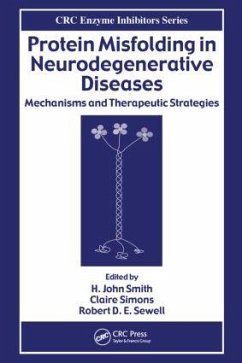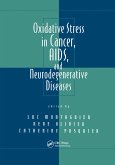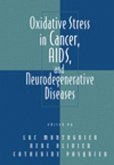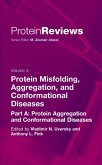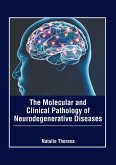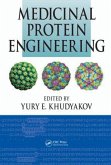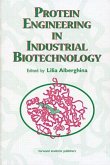Describes the findings regarding protein misfolding in the context of it being a marker, and perhaps a cause, in neurodegenerative diseases. This book covers the diverse biochemical targets/markers for each disease, the limited success of drug therapies, and the research that could lead to potentially more promising treatments.
Research focused on protein folding, misfolding, and aggregation is leading to major advances across biochemistry and medicine. The elucidation of a folding code is proving to be of extreme importance in the postgenomic era, where a number of orphan genes have been identified for which no clear function has yet been established. This research is starting to shed light on the molecular and biochemical basis of a number of neurodegenerative diseases of dramatic impact. Protein Misfolding in Neurodegenerative Diseases: Mechanisms and Therapeutic Strategies addresses key issues concerning protein misfolding and aggregation in neurodegenerative diseases. Building on recent developments, including the recognition of protein misfolding as both a marker and a causal agent, the text presents the work of those who are actively pursuing more effective treatments, as well as preventative measures, and a possible cure. These include the use of molecular chaperones to control misfolding and novel pharmaceuticals, as well as the potential role of various inhibitors and NSAIDS. A Comprehensive Multifaceted Examination of the Complex Causal Agents Implicated in Protein Misfolding Divided into five sections, this groundbreaking text provides up-to-date accounts for Alzheimer's, Parkinson's, Huntington's, Amyotrophic Lateral Sclerosis and Transmissible Spongiform Encephalitis. It also explores the highly likelihood that multiple factors, including oxidative stress, play a role in these complex diseases.
Hinweis: Dieser Artikel kann nur an eine deutsche Lieferadresse ausgeliefert werden.
Research focused on protein folding, misfolding, and aggregation is leading to major advances across biochemistry and medicine. The elucidation of a folding code is proving to be of extreme importance in the postgenomic era, where a number of orphan genes have been identified for which no clear function has yet been established. This research is starting to shed light on the molecular and biochemical basis of a number of neurodegenerative diseases of dramatic impact. Protein Misfolding in Neurodegenerative Diseases: Mechanisms and Therapeutic Strategies addresses key issues concerning protein misfolding and aggregation in neurodegenerative diseases. Building on recent developments, including the recognition of protein misfolding as both a marker and a causal agent, the text presents the work of those who are actively pursuing more effective treatments, as well as preventative measures, and a possible cure. These include the use of molecular chaperones to control misfolding and novel pharmaceuticals, as well as the potential role of various inhibitors and NSAIDS. A Comprehensive Multifaceted Examination of the Complex Causal Agents Implicated in Protein Misfolding Divided into five sections, this groundbreaking text provides up-to-date accounts for Alzheimer's, Parkinson's, Huntington's, Amyotrophic Lateral Sclerosis and Transmissible Spongiform Encephalitis. It also explores the highly likelihood that multiple factors, including oxidative stress, play a role in these complex diseases.
Hinweis: Dieser Artikel kann nur an eine deutsche Lieferadresse ausgeliefert werden.

